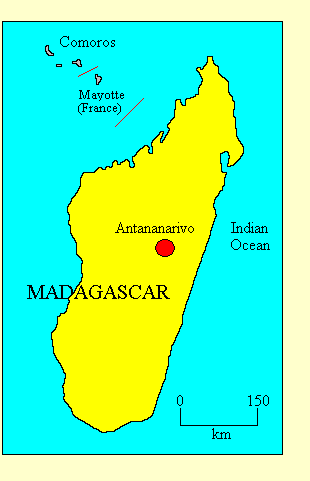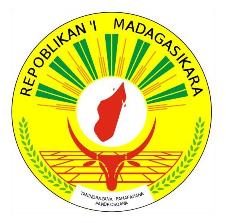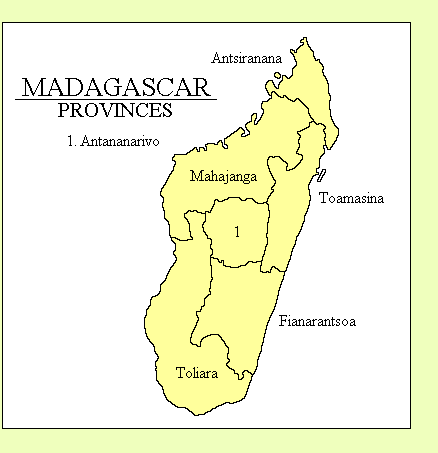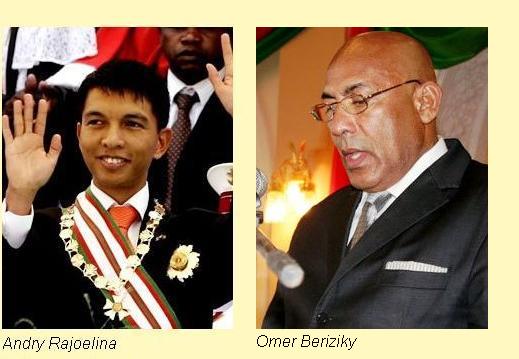

REPUBLIC OF MADAGASCAR
• Official name: Republikan'i Madagasikara / Republique de Madagascar (Republic of Madagascar)
• Location: Southern Africa
• International organisations: African, Caribbean and Pacific Group of States, African Union,
Non-Aligned Movement, Organisation Internationale de la Francophonie, United Nations, World Trade
Organisation
• Borders: None
• Coastline: Indian Ocean, Mozambique Channel
• Land area: 587,040 Km2
• Population: 20,700,000
• Annual GDP (PPP) per capita: US$1,000 (2009 CIA estimate). World ranking: 177
• Ethnicity: Nearly the whole population is of Madagascan stock (the Madagascans are of
Malayan-Polynesian origin). There are small minorities of Europeans and Indians.
• Languages: French and Malagasy are the official languages. Almost the whole population
speaks Malagasy, and French is used in business and the media.
• Religion: Indigenous beliefs 52%, Catholic Christian 41%, Sunni Moslem 7%
• Form of government: Presidential democratic republic. Madagascar is divided into six
provinces.
• Capital: Antananarivo
• Constitution: The Constitution of
the Republic of Madagascar came into effect on 19 August 1992.
• Head of state: The President, elected by direct universal suffrage for a five-year
term.
• Head of government: The Prime Minister, appointed by the President. The Prime Minister
is the leader of the largest party in the legislature and is accountable to it.
Omer Beriziky has been Prime Minister
since 28 October 2011.

• Legislature: Madagascar has a bicameral legislature. The
National Assembly
(Antenimieram-Pirenena / Assemblee Nationale) has 160 members, elected for four-year terms
from single- and two-member constituencies. The Senate (Senat) has 90 members,
60 elected for six-year term from the provinces, and 30 appointed. The legislature is currently suspended.
• Electoral authority: The Ministry of the Interior and Administrative
Reform administers national elections.
• Freedom House 2011 rating: Political Rights 6, Civil Liberties 4
• Transparency International Corruption Index: 26% (123 of 178 countries rated)
• Reporters Without Borders Press Freedom 2010 Index: 61.5% (116 of 178 countries rated)
• Heritage Foundation Economic Freedom 2010 Index: 61.2% (81 of 178 countries rated)
Political history
Most of Madagascar was ruled by the Merina Kingdom with its capital at Antananarivo until
conflicts over the activities of Christian missionaries led to French annexation in 1895. There was
little opposition to French rule until World War II, when the spectacle of Vichy and Free
French fighting each other aroused Madagascan hopes for independence. A legislative assembly
was created in 1946, but the French repressed a nationalist revolt by force. Internal self-
government was granted in 1956 and full independence, as the Malagasy Republic, followed in 1960.
Philbert Tsiranana, leader of the Social Democratic Party, was elected President and
retained office until 1972, when student rioting led to army intervention. General
Gabriel Ramanantsoa then ruled the country until a coup in 1975 brought General Didier
Ratsiraka to power. Ratsiraka renamed the country the Democratic Republic of Madagascar and established a
one-party socialist regime which held power until 1993, when under pressure of
demonstrations, Ratsiraka introduced democratic reforms. A new constitution was approved
by referendum and Albert Zafy was elected president.

In 1997 Ratsiraka returned to power as an elected President, but when he sought another term in
2002 he was beaten in the first round by the mayor of Antananarivo, Marc Ravalomanana. Ratsiraka
refused to accept defeat and the second round of the election was twice postponed due to disorders.
Ravalomanana declared himself elected and the country came close to civil war, but eventually Ratsiraka
left the country. Ravalomanana was comfortably re-elected in 2006.
Ravalomanana's rule grew increasingly autocratic and in 2007 he dissolved the National
Assembly. Protests led by the new mayor of Antananarivo, 34-year-old former disk jockey
Andry Rajoelina, led to the mayor's illegal
dismissal in January 2009. After more disturbances in February the army stepped in and forced Ravalomanana
to resign and leave the country. Rajoelina then declared himself Transitional President, promising elections
within two years. Although his government gained international recognition, it did not gained domestic
legitimacy. Amid continuing unrest, elections scheduled for May 2011 were postponed. Eventually African and
European diplomats brokered an agreement whereby political exiles returned and an all-party Cabinet was
formed under Omer Beriziky. Elections are now promised for early 2012.
Freedom House's 2011
report on Madagascar
says: "Madagascar is not an electoral democracy. The undemocratic and unconstitutional manner in which Andry
Rajoelina assumed the presidency in March 2009 demonstrated that the political culture has so far failed to
incorporate a rules-based system and the practice of peaceful democratic succession...
Corruption remains a major concern in Madagascar... The constitution officially provides for freedom of the press.
A 1990 law on press freedom was followed by the introduction of privately owned FM radio stations and more
critical political reporting by the print media. However, subsequent governments have at times curbed press
freedom in practice, and the media remain highly polarised and partisan... Freedom of association is generally
respected, and hundreds of nongovernmental organisations, including legal and human rights groups, are active.
Freedom of assembly was severely affected by the unrest in early 2009, as protests degenerated into riots and
looting, and security forces opened fire on demonstrators. In 2010, Rajoelina's government continued to sharply
restrict opposition protests... The judiciary remains susceptible to corruption and executive influence. Its
acquiescence in the face of Rajoelina's unconstitutional rise to power highlighted its weakness as an institution,
and subsequent judicial decisions were tainted by frequent intimidation."
Updated November 2011
|


